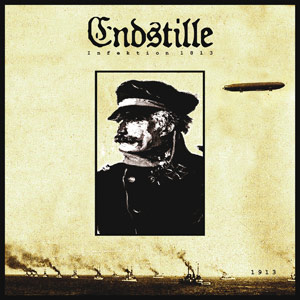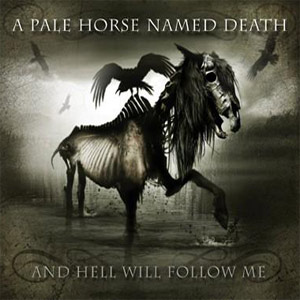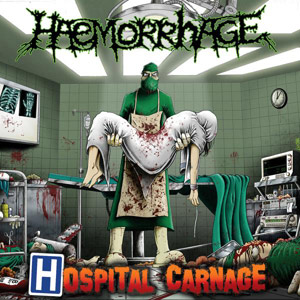
Abyssus Abyssum Invocat
Metal Blade
Behemoth’s rise to international metal stardom was unexpectedly and abruptly put on hold when the Polish band’s mastermind, Adam Darski (better known by the stage name Nergal), was diagnosed with leukemia. Luckily, his bone marrow transplant went off successfully and Nergal has recently begun to work on new music. In the meantime, Behemoth has repackaged two older EPs, 2003’s Conjuration and 2005’s Slaves Shall Serve, in a new release entitled Abyssus Abyssum Invocat. For those living under a rock, Behemoth began life churning out old-school black metal that eventually morphed into a brutal sound less definable. The standout tracks here are the live performances of several well-known Behemoth classics, including some early tracks that rarely make it into their sets nowadays. These performances come off with way more eardrum-clubbing harshness than their studio counterparts, which is saying something because the majority of Behemoth’s studio work is pretty damn intense in its own right. Also of note here are a few cover songs, including renditions of “Welcome to Hell” (Venom), “Penetration” (Nefilim) and “Wish” by Nine Inch Nails. This is a no-brainer for Behemoth diehards, but newbies would be better off acquainting themselves with the band with Demigod.

Infektion 1813
Season of Mist
German horde Endstille have been blasting out fast and fiercely intense black metal for nearly a decade now, and the group’s newest monstrosity, Infektion 1813, fits right in with the rest of their catalog. No keyboards and not much in the way of frills here, just slashing tremolo-picked minor-key riffs, blastbeats aplenty, and snarled lead vocals. However, Infektion 1813 is a little different from Endstille’s recent output as it seems the band has toned down its all blastbeats, all the time philosophy to allow room for tempo shifts, spooky samples, haunting backing vocals, and mature melodic passages on occasion. But don’t take that last attribute to mean that the band has gotten soft, as this album would fit alongside records by 1349 and Marduk just fine. The production is hazy yet loud and full sounding without coming off overproduced—just the way I like it.

Passion
Candlelight
I’ve been avoiding reviewing this album because I wasn’t sure what to make of it. There’s a lot going on within the fifth full-length from Britain’s Anaal Nathrakh. There’s plenty of loud, grinding guitars, lightning-quick blastbeats and agonizing screams courtesy of VITRIOL. But there’s also an electronic undercurrent running through Passion that separates it from the average black metal disc. Part of this feel is a result of the mechanized drums, not performed live but instead programmed by guitarist/bassist Irrumator. Still, the beats aren’t too synthetic and sound especially good when a double-bass section kicks in. Add in the occasional background keyboard and quasi-operatic sung clean vocal, and what you’ve got is a densely layered, intense record that cannot be pigeonholed. In a sea of by-the-numbers black metal, Passion stands out distinctly.

And Hell Will Follow Me
Steamhammer/SPV
It was quite a shock when Type O Negative vocalist and spokesman for the gothic metal underground Peter Steele died last year. Since then, fans of Type O and the sub-genre in which the band specialized have been looking for someone to pick up the torch and create music worthy of their adoration. Enter A Pale Horse Named Death, the new musical endeavor of former Type O Negative drummer turned singer/songwriter Sal Abruscato. A Pale Horse’s debut album, And Hell Will Follow Me, should satisfy goth metalheads with its mid-tempo metallic grooves, dark and deep vocal style, and songs about drugs, lust, murder, death, and general nihilism. The lyrics are slightly corny side, so here, the shorter the better, which also helps to keep the proceedings from getting too monotonous (something that was often hard to say about Type O).

The Sleeping Gods
Scion AV Metal
Norway’s Enslaved have managed to evolve tremendously over the course of their roughly 20-year existence, being characterized as every and type of metal along the way. With the release of the absolutely wonderful Axioma Ethica Odini full-length late last year, they indulged their recent penchant for writing melodically adventurous songs with enough black metal influence to keep things somewhat familiar for older fans.
Not even a year later, Enslaved return with a 5-song, 28-minute free (!) downloadable EP, The Sleeping Gods, which seems to pick up right where Axioma left off while not sounding entirely like a collection of outtakes either. Sure, it’s nowhere near as unbelievably fantastic as its predecessor, but while The Sleeping Gods may be lacking in overall quality, there are a variety of things going on song-to-song worthy of attention. Album opener “Heimvegen” is sung in Enslaved’s native tongue (both clearly and growled, depending on the vocalist), but musically, it’s more of mildly paced fare of their last several recordings. The next track, “Alu Misyrki,” picks up the pace, starting out with what sounds like a lost Motorhead riff before galloping drums kick in to send the song running along. It also boasts a great tremolo-picked solo that leads into a headbanging breakdown. “Synthesis” isn’t so much a song as it is six minutes of haunting low-end ambience, while the next track, “Nordlys,” is completely instrumental accented with keys. The final track “The Sleeping Gods,” is lead by some ominous tom and bass drum pounding that is soon joined by acoustic guitars and almost chant-like singing that give off the vibe of some kind of Viking folk song. Once again, Enslaved proves to be one of the most creative artists in modern metal and capable of tackling an array of sounds and styles with great skill.

One More for the Gallows
Southern Lord
It’s been a while since I’ve gotten to listen to a good crust record, and Summon the Crows’ One More for the Gallows sure hits the spot. Hailing from Oslo, STC is clearly influenced by crustcore legends like Doom and Extreme Noise Terror, but the album also shows a penchant for D-beat rhythms, and occasionally, the kind of guitar lick that wouldn’t sound out of place on an early Slayer album. The vocals are of the deep growly type, fitting, but not possessing much in the way of nuance or variety. The 10 songs clock in at 25 minutes total, so it’s fast, to the point, and potent.

Hospital Carnage
Relapse
Spain’s Haemorrhage have been puking up splattercore of notable quality for roughly 20 years now, although they’ve probably only been on most radars for the last decade. Regardless, the band is among the foremost practitioners of Carcass worship, and even a glance at the artwork to their new album, Hospital Carnage, makes that influence plainly obvious. All the early Carcass signatures are present here: grinding metallic grooves, downtuned guitars, drop-on-a-dime tempo shifts, drumming that is somewhat buried in the mix, and dual vocalists who alternately growl, bark, gurgle and burp their way through each relatively short song. Lyrically, Haemorrhage echoes Carcass’ obsession with med school terminology and general fascination with all manner of blood and guts. My main beef with this record is its production values. Taking a middle-road approach, it’s not quite clean and loud enough, yet it’s not dirty enough to really reek like its subject matter. Such gripes aside, Hospital Carnage is still a fun listen.

And So Our Troubles Began
Southern Lord
Southern Lord has been bringing obscure metal from abroad to the attention of American audiences quite a bit over the years, and the release of And So Our Troubles Began by Irish act Drainland is yet another feather in the label’s well-adorned hat. Drainland’s music isn’t easy to explain. The band bears traits of ’90s post-hardcore bands like Rorschach, Born Against and 1.6 Band, and can even sound like My War-era Black Flag at times. But there’s also plenty of sludgy metal chugging around here to engage an open-minded metalhead such as myself. Drainland isn’t afraid to pick up the pace, and the band has breakdowns galore, which is never a bad thing. Another intriguing element is their affinity for bleakness and atonality; depending on the moment, the guitars are either bent to the point of sonic dismay in a sea of feedback or invoking a depressive and nauseating vibe. And So Our Troubles Began is a gnarly, and at times, unpleasant listen, but its artistic merits should not be underestimated or overlooked.
Gary Spencer
